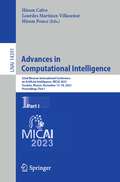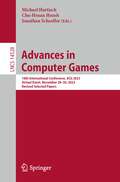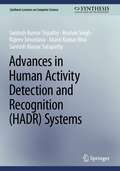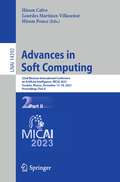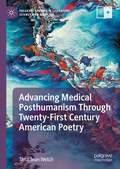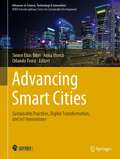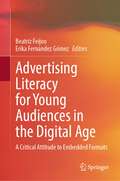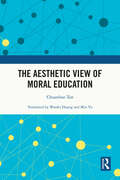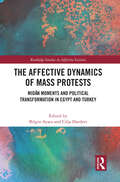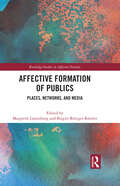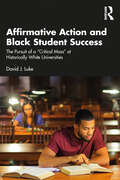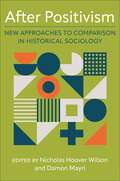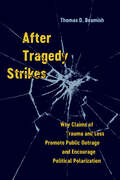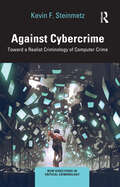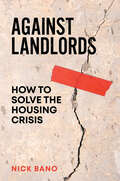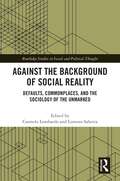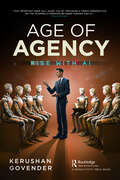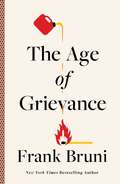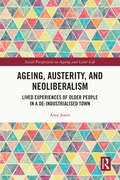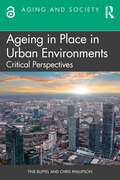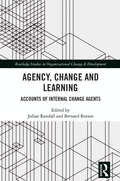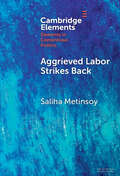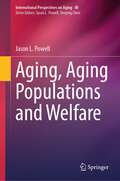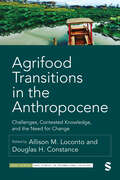- Table View
- List View
Advances in Computational Intelligence: 22nd Mexican International Conference on Artificial Intelligence, MICAI 2023, Yucatán, Mexico, November 13–18, 2023, Proceedings, Part I (Lecture Notes in Computer Science #14391)
by Hiram Calvo Lourdes Martínez-Villaseñor Hiram PonceThe two-volume set LNAI 14391 and 14392 constitutes the proceedings of the 22nd Mexican International Conference on Artificial Intelligence, MICAI 2023, held in Yucatán, Mexico, in November 2023.The total of 49 papers presented in these two volumes was carefully reviewed and selected from 115 submissions.The proceedings of MICAI 2023 are published in two volumes. The first volume, Advances in Computational Intelligence, contains 24 papers structured into three sections:– Machine Learning– Computer Vision and Image Processing– Intelligent SystemsThe second volume, Advances in Soft Computing, contains 25 papers structured into three sections:– Natural Language Processing– Bioinformatics and Medical Applications– Robotics and Applications
Advances in Computer Games: 18th International Conference, ACG 2023, Virtual Event, November 28–30, 2023, Revised Selected Papers (Lecture Notes in Computer Science #14528)
by Michael Hartisch Chu-Hsuan Hsueh Jonathan SchaefferThis book constitutes the refereed post proceedings of the 18th International Conference on Advances in Computer Games, ACG 2023, held online, during November 28–30, 2023.The 14 full papers included in this book were carefully reviewed and selected from 29 submissions. They were organized in topical sections as follows: Chess and its Variants, Solving Games, Board Games, Card Games, Player Investigation, Math, Games, and Puzzles.
Advances in Human Activity Detection and Recognition (Synthesis Lectures on Computer Science)
by Santosh Kumar Tripathy Roshan Singh Rajeev Srivastava Akash Kumar Bhoi Santosh Kumar SatapathyThis book provides a comprehensive overview of Human Activity Detection or Recognition (HADR) systems. Detection or recognition of human activities is a prominent research area in the fields of computer vision and artificial intelligence because of its many applications in daily life, including monitoring in public transport areas, health monitoring, anomaly detection in traffic, and smart homes. This book divides different activities according to their criticality, then discusses the various motivations and challenges that are involved in HADR systems. The authors then propose a framework for activity detection or recognition. The book also covers ten key applications of HADR systems and the recent developments for each of them. The authors also propose areas for future research.
Advances in Soft Computing: 22nd Mexican International Conference on Artificial Intelligence, MICAI 2023, Yucatán, Mexico, November 13–18, 2023, Proceedings, Part II (Lecture Notes in Computer Science #14392)
by Hiram Calvo Lourdes Martínez-Villaseñor Hiram PonceThe two-volume set LNAI 14391 and 14392 constitutes the proceedings of the 22nd Mexican International Conference on Artificial Intelligence, MICAI 2023, held in Yucatán, Mexico, in November 2023.The total of 49 papers presented in these two volumes was carefully reviewed and selected from 115 submissions.The proceedings of MICAI 2023 are published in two volumes. The first volume, Advances in Computational Intelligence, contains 24 papers structured into three sections:– Machine Learning– Computer Vision and Image Processing– Intelligent SystemsThe second volume, Advances in Soft Computing, contains 25 papers structured into three sections:– Natural Language Processing– Bioinformatics and Medical Applications– Robotics and Applications
Advancing Medical Posthumanism Through Twenty-First Century American Poetry (Palgrave Studies in Literature, Science and Medicine)
by Tana Jean WelchAdvancing Medical Posthumanism Through Twenty-First Century American Poetry places contemporary poetics in dialogue with posthumanism and biomedicine in order to create a framework for advancing a posthuman-affirmative ethics within the culture of medical practice. This book makes a case for a posthumanist understanding of the body—one that sees health and illness not as properties possessed by individual bodies, but as processes that connect bodies to their social and natural environment, shaping their capacity to act, think, and feel. Tana Jean Welch demonstrates how contemporary American poetry is specifically poised to develop a pathway toward a posthuman intervention in biomedicine, the field of medical humanities, medical discourse, and the value systems that guide U.S. healthcare in general.
Advancing Smart Cities: Sustainable Practices, Digital Transformation, and IoT Innovations (Advances in Science, Technology & Innovation)
by Simon Elias Bibri Anna Visvizi Orlando TroisiThis book presents a comprehensive exploration of the transformative journey toward smart cities and the implementation of cutting-edge technologies in urban development. Divided into four distinct parts, it covers a broad range of topics that contribute to sustainable, efficient, and innovative urban living. Encompassing diverse research from IEREK's Future Smart Cities (FSC) conference, it focuses on smart city advancement through sustainable practices, digital transformation, and IoT integration. Covering topics such as smart buildings, urban planning during pandemics, and IoT applications in health care and agriculture, this book shapes the future of urban living. It delves further into opportunities in city regeneration, human-centric smart design, IoT data effectiveness, and more. A valuable resource for academics, researchers, and policymakers, it offers insights into telecommunications, AI, smart manufacturing, and methodologies for urban ecosystem improvement.
Advertising Literacy for Young Audiences in the Digital Age: A Critical Attitude to Embedded Formats
by Beatriz Feijoo Erika Fernández GómezThis book analyzes how children and adolescents aged between 10 and 17 engage with digital advertising and highlights the importance of promoting advertising literacy to help young audiences recognize advertising and distinguish it from other media content in the digital age. As the advertising sector evolves, incorporating new formats like branded content and influencer marketing, the frontiers between commercial content and regular media become blurred, posing a challenge for children and adolescents to discern persuasive intent in advertising and distinguish advertising from other media content. In this context, it is crucial to assess children and adolescents’ preparedness to navigate digital advertising effectively by understanding their level of advertising literacy. With a higher level of advertising literacy, young audiences can evaluate advertisements, considering factors such as product appeal, presentation, and relevance to their experiences, as well as grasp thepurpose behind advertising and the techniques employed. This contributed volume brings together empirical studies and literature reviews to present an overview of the current research on advertising literacy among boys and girls aged between 10 and 17 in different countries to help educators, policymakers, advertisers, and society at large collaborate in nurturing responsible, informed, and ethically conscious digital citizens. Advertising Literacy for Young Audiences in the Digital Age: A Critical Attitude to Embedded Formats will be of interest to researchers working with media education, media sociology and childhood and adolescence studies. It will also help educators and policymakers develop better strategies to prepare children and adolescents to navigate digital advertising effectively.
The Aesthetic View of Moral Education
by Chuanbao TanThe Aesthetic View of Moral Education is the result of in-depth interdisciplinary research in education and aesthetic studies. This book advocates the use of aesthetic ideas and methods to transform moral education activities, which are often trapped in a state of forced indoctrination. This book aims to address the problems of moral education in China and share certain commonalities in the exploration of educational theory. The aesthetic view of moral education is a new and practical philosophy of education. The author's theory of moral education as the appreciation of beauty, the creation of beauty, and the theory of the attainment of the ultimate realm of moral education provide an in-depth analysis of the functions of aesthetic education for moral cultivation. The author also offers unique interpretations of the aesthetic transformation of the process of moral education itself and the pursuit of the realm of moral life and education. This book will be essential reading for students and scholars of education and philosophy, East Asian studies, and readers interested in China's cultural traditions.
The Affective Dynamics of Mass Protests: Midān Moments and Political Transformation in Egypt and Turkey (Routledge Studies in Affective Societies)
by Bilgin Ayata Cilja HardersThis book examines the connection between affects, mobilisation, and political transformation. Offering unique insights into the affective and emotional dynamics of occupied Tahrir and Taksim Squares, this book builds a novel understanding of urban mass protests and their capacity to “travel” across time and space. Its Midān Moment concept breaks new ground in affect and emotion studies with a focus on political transformation in Egypt and Turkey. It is based on empirically grounded research which covers the 2011 and 2013 uprisings and their authoritarian aftermath. This book will appeal to scholars and students interested in affect and emotion studies in a range of disciplinary areas, including political science, sociology, anthropology, area studies, cultural studies, gender studies, and postcolonial studies.
Affective Formation of Publics: Places, Networks, and Media (Routledge Studies in Affective Societies)
by Margreth Lünenborg Birgitt Röttger-RösslerThis book offers an interdisciplinary analysis of current formations of publics that is informed by in-depth knowledge of affect and emotion theory. Using empirical case studies from contexts as diverse as India, Pakistan, Tanzania, and the Americas as well as Europe, the book challenges dichotomous distinctions between private and public. Instead, publics are understood as a relational structure that encompasses both people and their physical and mediatized environment. While each kind of public is affectively constituted, the intensity of its affective attunement varies considerably. The volume is aimed at academic readers interested in understanding the dynamic and fluid forms of contemporary formation of publics—be it digital or face-to-face encounters as well as in the intersection of both forms. This includes researchers from media and communication studies, social anthropology, theatre or literary studies. It is aimed at advanced students of these disciplines who are interested in the unfolding of contemporary publics.
Affirmative Action and Black Student Success: The Pursuit of a "Critical Mass" at Historically White Universities
by David LukeDavid J. Luke’s Affirmative Action and Black Student Success is a concrete and comprehensive exploration into diversity programs on college campuses and their impact on Black student success and outcomes. Viewed over the span of 12 years, three large, public universities in the United States and Canada provide dynamic settings for this book’s comparative focus on diversity initiatives. The author identifies key regional and national differences between these settings, as well as differences in the way diversity is framed and understood to illustrate how diversity programs and policies are shaped and the extent and ways in which these programs and policies then shape student experiences and outcomes. The values and meanings organizations ascribe to diversity, inclusion, and equity are frequently in transition, and the book’s compelling analysis conveys the importance of race in these contexts—when racism is presumed to be in decline, as is the case in colorblindness and demonstrations of multiculturalist ideals, racial inequalities are concealed and remain unnoticed. The author makes a range of practical recommendations and argues that clear and explicit goals about race and representation are integral in the expansion and preservation of inclusive institutional environments. Unflinching in its critique and pragmatic with its recommendations, this book offers invaluable analysis for university leaders, diversity officers, and student affairs professionals, as much as it provides new insights for scholars and educators of racism, higher education, diversity, and organizational culture.
After Positivism: New Approaches to Comparison in Historical Sociology
by Wilson, Nicholas Hoover; Mayrl, DamonWhat is the value of comparison for research in historical sociology? Today, social scientists regularly express doubt about the positivist premises that have long justified comparison’s use: that cases can be unproblematically compared as though they are independent of one another, that comparison can reliably yield valid causal inference, and that comparative methods can grapple with questions of meaning, sequence, and process that are central to historical explanation. Yet they remain reluctant to abandon comparison altogether, not least because comparisons are still manifestly useful in the research process.After Positivism presents a bold new set of warrants and methodologies for comparison that takes these criticisms fully into account. The contributors to this book marshal a wide array of postpositivist approaches to knowledge to reconstruct the analytic potential of comparison for a new generation of social scientists. In addition to providing fresh answers to classic questions about case selection and causal inference, authors ponder the role comparison plays in a world where social phenomena are demonstrably time-, space-, and concept-dependent; where causation is typically conjunctural; where social structures and groups emerge and die; and where important objects of inquiry can be understood only in terms of relationships, emergent properties, or contingent and irregular effects. Engaging and timely, this book will be of interest to all those who seek to improve our explanations of historical change in social-scientific research.
After Tragedy Strikes: Why Claims of Trauma and Loss Promote Public Outrage and Encourage Political Polarization
by Thomas D. BeamishWhile trauma and loss can occur anywhere, most suffering is experienced as personal tragedy. Yet some tragedies transcend everyday life's sad but inevitable traumas to become notorious public events: de facto "public" tragedies. In these crises, suffering is made publicly visible and lamentable. Such tragedies are defined by public accusations, social blame, outpourings of grief and anger, spontaneous memorialization, and collective action. These, in turn, generate a comparable set of political reactions, including denial, denunciation, counterclaims, blame avoidance, and a competition to control memories of the event. Disasters and crises are no more or less common today than in the past, but public tragedies now seem ubiquitous. After Tragedy Strikes argues that they are now epochal—public tragedies have become the day's definitive social and political events. Thomas D. Beamish deftly explores this phenomenon by developing the historical context within which these events occur and the role that political elites, the media, and an emergent ideology of victimhood have played in cultivating their ascendence.
Against Cybercrime: Toward a Realist Criminology of Computer Crime (New Directions in Critical Criminology)
by Kevin F. SteinmetzThis book advances a theoretically informed realist criminology of computer crime. Looking beyond current strategies of online crime control, this book argues for a new sort of policy that addresses the root causes of computer crime and criminality, reduces the harms experienced by the victims of such crimes, and does not unduly contribute to state and corporate power and surveillance. Drawing both on the proponents of realist criminology and on those who have leveled critiques of the approach, Steinmetz illustrates the contours of a realist criminology of computer crime by considering definitions of harm with online crime, the idiosyncrasies of online locality and community, the social relations of computer crime, the tension between piecemeal reform and structural changes, and other matters. Furthermore, Steinmetz surveys the methodological dimensions of computer crime research, offers a critique of positivist “computational criminology,” and posits an agenda for computer crime policy. Against Cybercrime is an essential reading for all those engaged with cybercrime, realist criminology, criminological theory, and social harm online.
Against Landlords: How to Solve the Housing Crisis
by Nick BanoWhen landlords always win and renters pay the price, what can be done?Housing means prosperity and security for some; poverty, precarity and sickness for others. More people live in private rented accommodation than ever before, and rents rise without apparent reason. Homes are smaller every year, and nearly 20 per cent of tenants live in hazardous conditions. Homelessness is at a new high. Yet the government&’s only solution is to promote homeownership.Against Landlords shows that this crisis is not the product of happenstance or political incompetence. Government policy has intentionally split British citizens into homeowners and renters, two classes set on very different financial paths. In the UK, one out of every twenty-one adults is a landlord, and it is this group, and those who aspire to join it, represented by the political class.In his radical new interpretation of the housing crisis, lawyer Nick Bano explains how this environment set the conditions for the Grenfell Tower fire and how it means a life of anxiety for the nation&’s renters. It is a problem that stretches far beyond London and one inherently racist in nature.Building more housing is not the solution. It is firstly a problem of the law, Bano argues, and reforms must sweep away the landlordism at the heart of the housing crisis and British political life.
Against the Background of Social Reality: Defaults, Commonplaces, and the Sociology of the Unmarked (Routledge Studies in Social and Political Thought)
by Carmelo Lombardo Lorenzo SabettaThe first wide-ranging, organic analysis of the sociology of unmarkedness and taken-for-grantedness, this volume investigates the asymmetry between how we attend to the culturally emphasized features of social reality and ignore the culturally unmarked ones. Concerned with the structures of cultural invisibility, unconscious rules of irrelevance, automatic frames of meaning, and collective attention patterns, it brings together scholarship spanning sociology, anthropology, and social psychology, to cover various aspects of humdrum, unglamorous, nondescript, nothing-to-write-at-home-about social phenomena, developing the key assumptions, underpinnings, and implications of this field of study.As comprehensive analysis of unremarked features of our social existence, this book will appeal to scholars across the social sciences with interests in social theory and the sociology of everyday life.
Age of Agency: Rise with AI
by Kerushan Govender"When the digital world started, many companies moved slowly and cautiously, not willing to replace their traditional operations. Now most companies have gone digital. We are now moving beyond digital into an AI world. Don't ignore it. This important book will guide you by providing a fresh perspective on the interrelationships between humans and AI." – Philip Kotler Do you feel overwhelmed by the AI wave? Worried that it could cost you your job, harm your business, or even take over? AI has pervaded our lives and is aggressively disrupting business. No person today can afford to ignore AI. Age of Agency is your companion, helping you leverage AI's capabilities to power your productivity and success. By understanding AI, you will learn to use it as a tool for personal career growth and business success. Former Microsoft executive Kerushan Govender demystifies AI, emphasising the importance of human agency. Reconnect with the needs of humanity and learn the importance of care as a differentiator in an AI world. Avoid the potential pitfalls of excessive reliance on the technology. Age of Agency is a blueprint for ensuring human agency outpaces computer agency. It boldly pits the limits of machine learning against the infinity of human ability. With this survival guide, you’ll uncover ways to connect with humanity on a deeper level, going beyond anything AI can do. Ready to become AI-savvy, with your humanity as your differentiator? Dive into the future with the confidence to ride the wave of today’s AI revolution.
The Age of Grievance
by Frank BruniThe twists and turns of American politics today have become nearly impossible to predict, but the tone is a troubling given. It's one of grievance. A perilous share of Americans across the full breadth of the political spectrum respond to every big disappointment, every little frustration, every way in which the world doesn't hew precisely to their liking by deciding that they've been wronged, identifying the people responsible for that and raging at the injustice of it all. The blame game is the country's most popular sport and victimhood its most fashionable garb. <P><P> Grievance isn't always and necessarily bad. It has often done enormous good. The United States is a nation born of grievance, in the revolt of royal subjects unwilling to accept a bad deal, and across the nearly 250 years of our existence as a country, grievance has been the engine of morally urgent change. But what happens when all sorts of grievances—the greater ones, the lesser ones, the authentic, the invented—are jumbled together? When grievances become all-encompassing lenses, all-purpose reflexes, default settings? When people take their grievances to extreme and even violent lengths that they didn't before? <P><P> A violent mob storms the US Capitol, rejecting the results of a presidential election and embracing the fiction that it was rigged. Conspiracy theories flourish. Politicians appeal not to our better angels but to our worst impulses, encouraging selfishness instead of selflessness, trading inspiration for retribution. Fox News, the country's most watched cable news network, and Tucker Carlson, its sneering star, knowingly peddle lies in the service of profit. The Supreme Court loses touch with the country, overturning Roe v. Wade and shrugging off Clarence Thomas's transgressions. College students chase away speakers and college administrators dismiss instructors for dissenting from progressive orthodoxy. Will Smith slaps Chris Rock. And there's a potentially devastating erosion of the civility, common ground and compromise necessary for our democracy to survive. <P><P> How did we get here? What does it say about us, and where does it leave us? Timely, important, and enlightening, The Age of Grievance examines these critical questions and charts a path forward for a nation that may be growing tired of outrage. <p> <b>New York Times Bestseller</b>
Ageing, Austerity, and Neoliberalism: Lived Experiences of Older People in a De-Industrialised Town (Social Perspectives on Ageing and Later Life)
by Amy JonesThis book explores how neoliberalism and austerity have affected older people living within a deindustrialised town, utilising a Foucauldian approach and an ethnographic methodology. It seeks to bridge the gap between high sociological theory and a research focus upon older people. The link between the micro (real people, within a real place) and macro (abstract processes) is examined, and a mid-range theory of change is innovatively developed to highlight how older people are having to negotiate national transformations at the everyday level. Key themes within this book include the recreation of human subjectivity, antiwelfarism, the stigmatisation and exclusion of the poor, the fragmentation of the working class, and nostalgia. Innovative terms such as ‘stigma-adaptation’ and ‘abnormal abnormality’ are included to help deepen our knowledge and understanding of the social sciences, to highlight the injustices caused by current global processes, and to ultimately inform change. This book will be of interest to scholars and students across the social sciences, particularly those studying inequalities in the modern world, neoliberalism and the economy, social theory, ageing and older people and community studies, and postgraduates who are seeking to undertake applied research. It would also be valuable for policymakers and service providers.
Ageing in Place in Urban Environments: Critical Perspectives (Aging and Society)
by Tine Buffel Chris PhillipsonAgeing in Place in Urban Environments considers together two major trends influencing economic and social life: population ageing on the one side and urbanisation on the other. Both have been identified as dominant demographic trends of the twenty-first century. Cities are where the majority of people of all ages now live and where they will spend their old age. Nevertheless, cities are typically imagined and structured with a younger, working-age population in mind while older people are rarely incorporated into the mainstream of thinking and planning around urban environments. Cities can contribute to vulnerability arising from high levels of population turnover, environmental problems, gentrification, and reduced availability of affordable housing. However, they can also provide innovative forms of support and services essential to promoting the quality of life of older people. Policies in Europe have emphasised the role of the local environment in promoting “ageing in place”, a term used to describe the goal of helping people to remain in their own homes and communities for as long as they wish. However, while this has been the dominant approach, the places in which older people are ageing have often proved to be challenging environments. The book explores the forces behind these developments and how older people have responded. Drawing upon approaches from social gerontology, urban studies, geography, and sociology, this book will be essential reading for researchers, policymakers, and practitioners searching for innovative ways to improve the lives of older people living in urban environments.
Agency, Change and Learning: Accounts of Internal Change Agents (Routledge Studies in Organizational Change & Development)
by Julian Randall Bernard BurnesDespite the plethora of books on change, there appears a notable gap in the field; rarely is the authentic and candid voice of change agents heard. How often do academics or practitioners candidly state what they actually do when they are faced with managing change in their own organisations or when they are called on in a consultancy capacity? In this new book, the editors bring together a diverse group of contributors who have worked as Internal Change Agents in organizations to divulge what they really do and think about change. The authors draw on their own research work involving change agents and their change interventions and include current reflections on the post-Covid world of work, and the change required for achieving change interventions successfully. Each contribution offers perspectives from real change programmes, in both the public and private sector, offering a unique opportunity to move beyond theory and understand change in practice. The book offers valuable insights for academics and students of organisational change and behaviour, leadership and organisational development.
Aggrieved Labor Strikes Back: Inter-sectoral Labor Mobility, Conditionality, and Unrest under IMF Programs (Elements in Contentious Politics)
by null Saliha MetinsoyWhy do we see large-scale labor protests and strikes under some IMF programs such as in Greece in 2010 and not in others such as in Ireland in the same year? This Element argues that extensive labor market reform conditions in an immobile labor market generate strong opposition to programs. Labor market reform conditions that decentralize and open up an immobile labor market cause workers either to lose in terms of rights and benefits, while being stuck in the same job or to fall into a less protected sector with fewer benefits. Conversely, in more mobile labor markets, wage and benefit differentials are low, and movement across sectors is easier. In such markets, labor groups do not mobilize to the same extent to block programs. The author tests this theory in a global sample and explores the causal mechanism in four case studies on Greece, Ireland, Latvia, and Portugal.
Aging, Aging Populations and Welfare (International Perspectives on Aging #40)
by Jason L. PowellAs the world experiences a rapid increase in the aging population, it is essential to address the challenges and opportunities that arise as a result. This book explores the significant impact of aging on individual well-being, societal welfare systems, and the global economy. By examining the multifaceted aspects of aging, demography and welfare, the book aims to provide a comprehensive and critical narrative to navigating these challenges and achieving better outcomes for both older individuals and society as a whole. The book has a critical approach running through it; despite this, there is a need to do something with the critical questions and focus on sustainable solutions to problems and issues an aging population poses to researchers, policy makers and older people themselves. In essence, the primary purpose of this book is to shed light on the complexities surrounding aging, demography and its intersection with welfare systems. By delving into various perspectives, such as social, economic, and healthcare considerations, this book highlights the holistic understanding needed to address the challenges associated with an aging population effectively.
Agrifood Transitions in the Anthropocene: Challenges, Contested Knowledge, and the Need for Change (SAGE Studies in International Sociology)
by Allison M. Loconto Douglas H. ConstanceThe greatest challenges of the twenty-first century stem from the fact that we are now living in a new epoch: the Anthropocene. The human footprint on the planet can no longer be denied. One of the greatest and most essential human innovations, agriculture, is being increasingly recognised as a leading contributor to climate change. According to global governance bodies, the world will need to feed a predicted nine billion people by 2050. However, in this Anthropocene, we must address the environmental inequalities in how these people will be fed. This book explores our current societal struggles to transition towards more sustainable agrifood systems. It suggests that debates around sustainable agriculture must be social as well as technical, exploring the growth of social movements campaigning for more democratic food systems. However, as each chapter demonstrates, both the problems and the solutions in sustainable agriculture are highly contested. Using the term ′agrifood′ to capture the nexus between research, governance and the environment knowledge-environment-governance, this book provides an in-depth and wide-ranging account of current research around agricultural production and food consumption. The book introduces the Anthropocene along with the fundamental question that it poses about human-nature interactions. It outlines the core concerns related to agriculture and food and the debates around the need for agrifood system transitions. Each chapter investigates controversies in the field through case studies. These contributions offer a call for sociologists of agriculture and food to engage with the controversies unfolding in the Anthropocene.
Agrifood Transitions in the Anthropocene: Challenges, Contested Knowledge, and the Need for Change (SAGE Studies in International Sociology)
by Allison M. Loconto Douglas H. ConstanceThe greatest challenges of the twenty-first century stem from the fact that we are now living in a new epoch: the Anthropocene. The human footprint on the planet can no longer be denied. One of the greatest and most essential human innovations, agriculture, is being increasingly recognised as a leading contributor to climate change. According to global governance bodies, the world will need to feed a predicted nine billion people by 2050. However, in this Anthropocene, we must address the environmental inequalities in how these people will be fed. This book explores our current societal struggles to transition towards more sustainable agrifood systems. It suggests that debates around sustainable agriculture must be social as well as technical, exploring the growth of social movements campaigning for more democratic food systems. However, as each chapter demonstrates, both the problems and the solutions in sustainable agriculture are highly contested. Using the term ′agrifood′ to capture the nexus between research, governance and the environment knowledge-environment-governance, this book provides an in-depth and wide-ranging account of current research around agricultural production and food consumption. The book introduces the Anthropocene along with the fundamental question that it poses about human-nature interactions. It outlines the core concerns related to agriculture and food and the debates around the need for agrifood system transitions. Each chapter investigates controversies in the field through case studies. These contributions offer a call for sociologists of agriculture and food to engage with the controversies unfolding in the Anthropocene.
